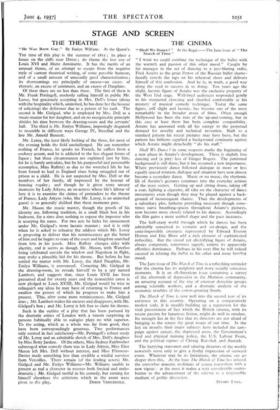STAGE AND SCREEN
THE THEATRE
"lie Was Born Gay." By Emlyn Williams. At the Queen's.
THE time of this play is the summer of 1815 ; its place a house on the cliffs near Dover ; its theme the lost son of
Louis XVI and Marie Antoinette. It has the merits of an unusual theme, of an attempt to escape from the negative style of current theatrical writing, of some passable humour, and of a small amount of unusually good characterisation ; its shortcomings are principally of excess—an cam:: of rhetoric, an excess of sentiment, and an excess of Dauphins.
Of these there are no less than three. The first of them is Mr. Frank Pettingell, modestly calling himself in public Mr.
Leroy, but graciously accepting in Mrs. Dell's house (along with the hospitality which, uninvited, he has done her the honour of soliciting) the deference due to a person of his rank. The second is Mr. Gielgud, who is employed by Mrs. Dell as a music-master for her daughter, and on no recognisable principle divides his time between the drawing-room and the servants' hall. The third is Mr. Emlyn Williams, imposingly disguised to resemble in different ways George IV, Stendhal and the late Mr. Arnold Bennett.
Mr. Leroy, the least likely looking of the three, for most of the evening holds the field unchallenged. He can remember nothing of France, he speaks no French, he suffers from a cockney accent, and he is addicted to the less elegant forms of liquor ; but these circumstances are explained (not by him, for he is barely articulate, but by his purposeful and personable accomplice, Miss Raffety) as due to the wretched life he has been forced to lead in England since being smuggled out of prison as a child. He is not suspected by Mrs. Dell or the members of her family, all impressed by the honour of housing royalty ; and though he is given some uneasy moments by Lady Atkyns, an ex-actress whose life's labour of love it is to examine the claims of pretenders to the throne of France, Lady Atkyns (who, like Mr. Leroy, is an uninvited guest) is so generally disliked that these moments pass.
Mr. Mason the music master, though the proofs of his identity are, following tradition, in a small black box in his bedroom, for a time does nothing to expose the impostor who is usurping his name. For two acts he hides his amusement under Mr. Gielgud's more laconic manner ; and it is only when he is asked to rehearse the address which Mr. Leroy is proposing to deliver that his reminiscences get the better of him and he begins to orate of the court and kingdom snatched from him in his youth. Miss Raffety changes sides with alacrity, and it seems as though Mr. Mason, with Waterloo being celebrated outside the window and Napoleon in flight, may make a plausible bid for his throne. But before he has settled the matter with Mr. Leroy, the third Dauphin, Mr. Emlyn Williams, is announced. Cornering Mr. Gielgud in the drawing-room, he reveals himself to be a spy named Lambert, and suggests that, since Louis XVII has been presumed dead for twenty years and the monarchist cause is now pledged to Louis XVIII, Mr. Gielgud would be wise to relinquish any ideas he may have of returning to France and swallow the poison of which he proposes to make him a present. This, after some more reminiscences, Mr. Gielgud does ; Mr. Lambert makes his excuses and disappears, with Mr. Gielgud's box ; and Mr. Leroy is left free to claim his throne. Such is the outline of a play that has been pursued by the dramatic critics of London with a venom surprising in persons habitually able to eulogise plays no whit superior.
To the acting, which as a whole was far from good, they have been correspondingly generous. Two performances only seemed in fact satisfactory—Mr. Pettingell's robust study of Mr. Leroy and an admirable sketch of Mrs. Dell's daughter by Miss Betty Jardine. Of the others, Miss Sydney Fairbrother submerged what comedy there was in Lady Atkyns, Miss Eliot Mason left Mrs. Dell without interest, and Miss Ffrancon- Davies made something less than credible a wistful survivor from Versailles. There remain (of the leading actors) Mr. Gielgud and Mr. Emlyn Williams—Mr. Williams unable to present as real a character in essence both farcical and melo- dramatic ; Mr. Gielgud tactful in his comedy, but earning for himself elsewhere the criticisms which in the event were










































 Previous page
Previous page